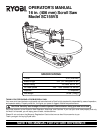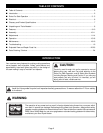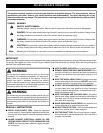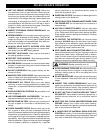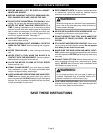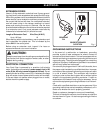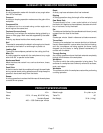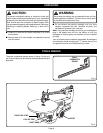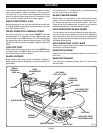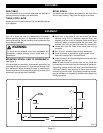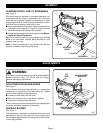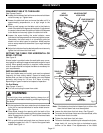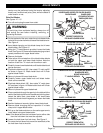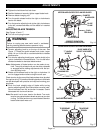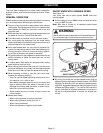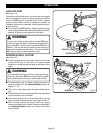
Page 7
Bevel Cut
A cutting operation made with the table at any angle other
than 90˚ to the blade.
Crosscut
A cutting or shaping operation made across the grain of the
workpiece.
Compound Cut
A compound cut is a cut made using a miter angle and a
bevel angle at the same time.
Freehand (for scroll saw)
Performing a cut without the workpiece being guided by a
fence or miter gage. Work must be supported by the table.
Gum
A sticky, sap based residue from wood products.
Kerf
The material removed by the blade in a through cut or the slot
produced by the blade in a nonthrough or partial cut.
Leading End
The end of the workpiece pushed into the cutting tool first.
Miter Cut
A cutting operation made with the workpiece at any angle
other than 90˚ or parallel to the blade.
Nonferrous Metal
Metal that does not contain iron; such as aluminum, brass,
and copper.
Push Stick
A device used to feed the workpiece through the saw blade
during narrow wood cutting operations and helps keep the
operator's hands well away from the blade.
Resaw
A cutting operation to reduce the thickness of the workpiece
to make thinner pieces.
Resin
A sticky, sap base substance that has hardened.
Ripping
A cutting operation along the length of the workpiece.
Saw Blade Path
The area directly in line — over, under, behind, or in front of
the blade. As it applies to the workpiece, that area which will
be, or has been, cut by the blade.
Set
The distance that the tip of the saw blade tooth is bent (or set)
outward from the face of the blade.
SPM
Strokes per minute. Used in reference to blade movement.
Throw-Back
Throwing of a workpiece in a manner similar to a kickback.
Usually associated with a cause other than the kerf closing,
such as a workpiece not being against the fence, being
dropped into the blade, or being placed inadvertently in
contact with the blade.
Through Sawing
Any cutting operation where the blade extends completely
through the thickness of the workpiece.
Workpiece
The item on which the cutting operation is being done. The
surfaces of a workpiece are commonly referred to as faces,
ends, and edges.
Worktable
The surface on which the workpiece rests while performing
a cutting operation.
GLOSSARY OF TERMS FOR WOODWORKING
Throat 16 in.
Motor 120 V, 1.2 amp, 60 HZ-AC only
Drive Variable Speed
400 – 1550 Strokes per minute
Blade Length 5 in. plain or pin
Table Tilt 45˚
Net Weight 32 lb. (14 kg.)
PRODUCT SPECIFICATIONS



